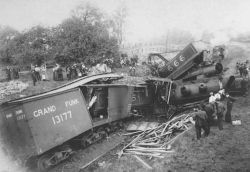Will DTV Transition Go Off the Rails?

"These consumers will be confused, frustrated and angry that this important information and entertainment source in their home is no longer operational, through no fault of their own," declared Nelda Barnett of American Association of Retired Persons. AARP notes that Americans over 50 watch more TV than any demographic group. They may have "potential difficulties in attaching the [digital] converter box to the back of their set," said Barnett, and may feel some "confusion regarding the transition itself."
Supporting this viewpoint is a poll conducted by the Association for Public Television Stations, showing that 61 percent of respondents were unaware of the DTV transition.
The federal government will offer $40 coupons to ease the transition of analog-TV households into the digital-TV era. The National Association of Broadcasters and the Consumer Electronics Association have a difference of opinion concerning prospects for the program's success.
While the coupon program is funded up to $1.5 billion, only $5 million is set aside for publicizing the DTV transition. NAB pledges to run public service announcements worth tens of millions to publicize the transition, starting in December.
























































